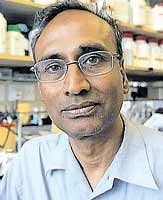Venki goes beyond chemistry

Madras University’s 4,500-seat ''Centenary Auditorium'' was full to capacity with school and college students along with their teachers jostling for a rare interaction with Ramakrishnan, popularly known as ''Venki.''
He included in his first public interaction in India, after receiving the Nobel Prize for Chemistry recently, a popular lecture on “Ribosome and how antibiotics work on Ribosomes,” his area of research for long years. That was marked by a different kind of chemistry which involved bonding with the students by prefering to eat the simple vegetarian meal served for all. Nevertheless, Ramakrishnan politely turned down Madras University’s request to receive any honorary doctorate.
Optimism marked the scientist’s positive assessment of Indian science.
When a schoolgirl asked him whether students aspiring to work on award-winning basic science had to necessarily pursue the subjects in universities abroad, Ramakrishnan admitted he had left for the US at the age of 19, never to come back to live here.
“Of course, you can go abroad to study” as there are many good universities there. “But I hear from my colleagues here that there is a lot more money in research now in India than it was 20 or 30 years ago,” remarked Ramakrishnan.
“There are good alternatives here,” he said. “You can get trained very well here.”
Ramakrishnan earlier inaugurated Madras University’s “A L Mudaliar Centre for Basic Sciences and Development.” Vice-Chancellor G Thiruvasagam was present on the occasion.
Later, at an interaction with the media, Venki endorsed Prime Minister Manmohan Singh’s appeal to Indian scientists abroad to return. “You can make it possible. Scientists, particularly with very strong emotional ties, would like to come back to India,” he noted.
The 57-year old scientist said there were two good scientists in his laboratory, with excellent publsihed papers, who would return to Pune to start their own laboratories.
Citing a major initiative by China to bring back Chinese scientists from the United States of America and elsewhere to their country, Ramakrishnan said a similar thing in India was also possible “if scientists have autonomy, freed from the bureaucracy, red-tape and local politics.
Such an environment could make scientists feel they can do good science,” the scientist stressed.
In the MRC Lab on Molecular Biology in Cambridge, where he has been working, “I go strictly by merit; I don’t care about nationality,” Ramakrishnan said.
It was increasingly difficult, though, to get students and researchers from outside the European Union or even the United States because of the “new visa regulations” in the United Kingdom, he pointed out.
Deccan Herald is on WhatsApp Channels| Join now for Breaking News & Editor's Picks